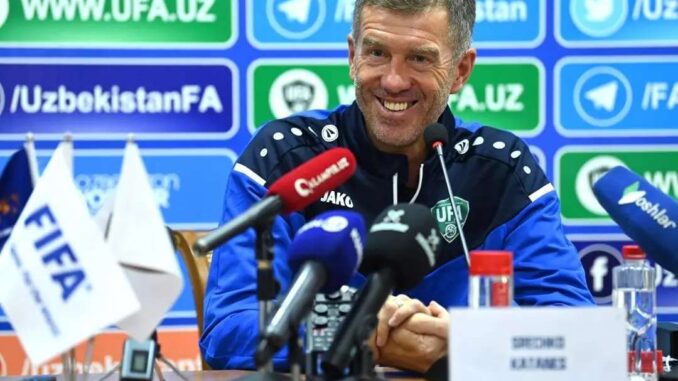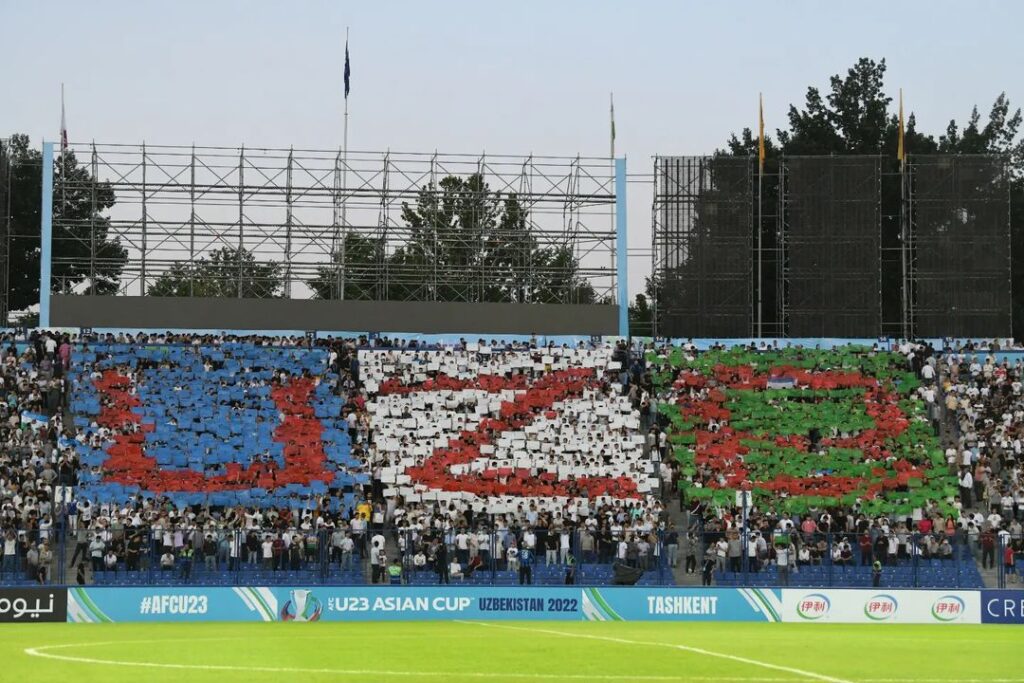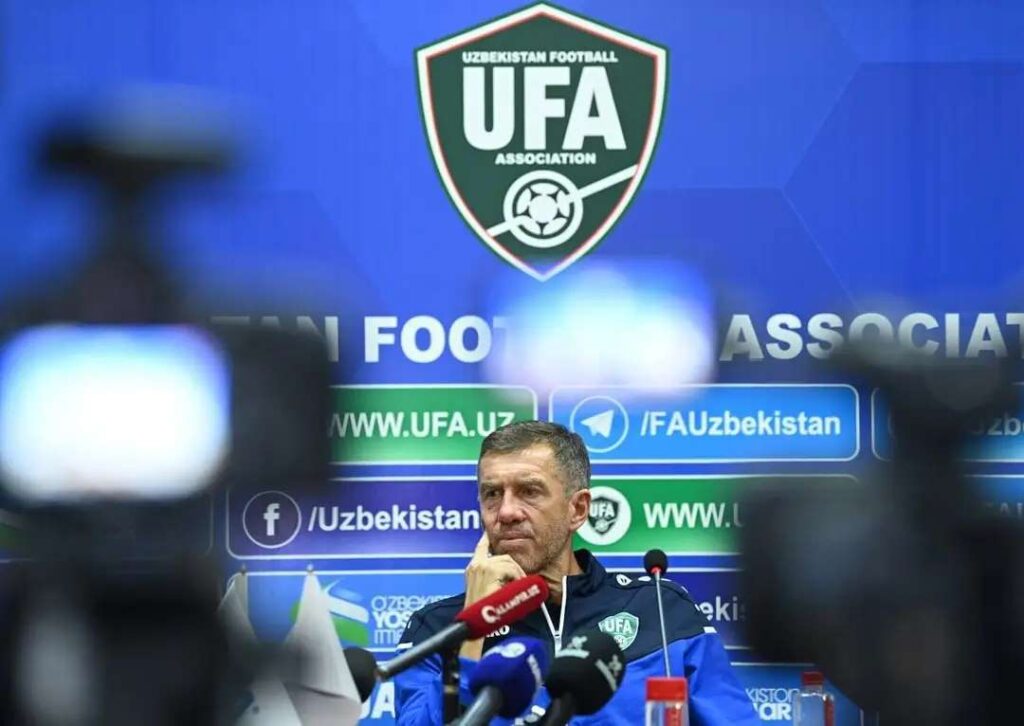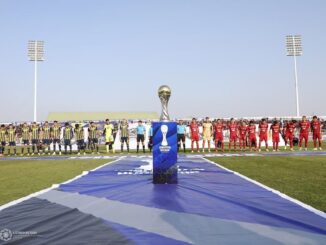
Uzbekistan were last week a mere stoppage time away from making it eight wins from eight in 2022.
Having beaten the likes of Thailand and Cameroon since March, it’s been a devastating turnaround for the national team, in comparison to the preceding year that many in the nation’s football scene were keen to forget had ever happened.
Under new coach Srecko Katanec there’s a positive feel around Uzbek football, but there’s much more than a change in coach that has lifted the mood across the country, as the coach explained when he caught up with The Asian Game recently.
Style and substance, Katanec appeals to Uzbekistan
Katanec’s appointment followed a significant defining point for the national team. Uzbekistan had failed to make it to the final round of Asian World Cup qualification for the first time in their history. A crushing defeat away in Riyadh to one of the continent’s eventual qualifiers Saudi Arabia was a distinct wake up call as to the growing chasm between Uzbekistan and the elite in Asia.
With World Cup expansion on the horizon, and Asia’s allocation set to double from four to eight guaranteed spots for 2026, the assumption in Asian football circles was that Uzbekistan would be a prime candidate for one of these newly acquired opportunities, given the decades of near misses in their recent past. Uzbekistan’s stumble ahead of the final round of qualification, however, cast doubt on their hopes moving forward; was this another sign of their mental fragility on the international stage?
While the 3-0 defeat in Saudi Arabia put the final nail in their qualification hopes, the writing was on the wall back in 2019 ahead of the campaign’s enforced hiatus caused by the global pandemic. Uzbekistan, leading 2-1 after 85 minutes in Tashkent to their group rivals from the Gulf, let slip not only the win, but also a credible draw, with Herve Renard’s Saudi Arabia somehow escaping with a 3-2 victory in the dying moments of the match.
This manner of the collapse wasn’t lost on Katanec, speaking of the event that occurred two years before he acquired the national team coaching role, he said:
“How (did) they lose against Saudi Arabia at home? This is ridiculous! But in football, this happens. The players need to leave this game now and move on.”
The isolated result, and the campaign as a whole, was a learning curve for Uzbekistan. Reacting to a disappointing and worryingly expensive stint for Hector Cuper between 2018 and 2019, local coach Vadhim Abramov’s positive, Avant Garde approach, while having its merits, didn’t provide the results to match its ambition. For any national team, such a shift in philosophy is going to split the crowd, but for Uzbek fans, who have grown up on a cautious, defence first mentality this was going too far.
Katanec’s pragmatic and calm demeanour, therefore, feels a much snugger fit for the country. After years of quite enigmatic coaches whose heart was always on show in every press conference, Katanec’s introspective outlook is welcomed.
“I don’t like this modern football now,” he said, “which all the teams like to press. It’s impossible to play 90 minutes like this. They (are) start(ing) to understand they have the qualities to play another way.”
While other nations would be alarmed at such a statement, as they look to compete at the highest levels of the game, such a down to earth approach to “proper football” seems to strike a chord in Uzbekistan.
It’s strikingly similar to the manner in which former Dynamo Kyiv and Uzbek striking great Maksim Shatskikh’s arrived at domestic champions Pakhtakor earlier this year, when he spoke of greater discipline and a return to the simpler days of football. Katanec’s realistic viewpoint gels well with a nation’s football that is still coming to terms with how they should act in order to succeed.
Long-term vision
Katanec’s appointment and direction is one aspect of a much longer-term plan for the nation’s football, however. While success is starting to bear fruit, albeit in non-competitive play at senior level, the focus of this progress is aimed at the lower levels of youth football within the national team setup.
With a focus on driving quality at a younger age group, talent has subsequently blossomed, be it at international level through their U23 Asian Cup triumph in 2018 and their run to the final this summer, or at domestic level, in the recently formed Olympic FC – a manufactured hot house of talent and youth international team in all but name, playing in the domestic league in order to offer regular competitive football in a structured, cohesive environment.
The team, overseen by former national captain Timur Kapadze, a significant player in the UFA structure, has seen immense improvement, from their second-tier promotion as an U20 outfit last year, to a likely mid-table finish and regular giant killing feats in the Uzbek Super League as an U21 side this term.
The ambition is clear, qualification for the tournament in France of its namesake is paramount in two years’ time, with an impressive and successful continental campaign in next year’s U23 Asian Cup expected to supplement their progress.
“The Olympic team are growing up really fast,” Katanec said of the team he sees as essential to the senior team’s development. “They play quite good football. Normally young players need experience, but this project, which is already playing in the league system, is going well.”
Uzbekistan haven’t stopped at developing players with significant resources also deployed in impacting wider aspects. Hosting this summer’s U23 Asian Cup, and with the U19 iteration of the event to come, the hope of inspiring the whole country in football, is a clear direction to seek improvement moving forward.

This investment and focus on talent and infrastructure has also coincided with the most competitive league season in recent memory.
National giant Pakhtakor’s monopoly for the last few seasons was strengthened in no small way by the lack of opposition pushing them at the summit. Their struggles, both in Uzbekistan and within the AFC Champions League of late, accompanied with the push from other elements of the country, has seen that reverse into a tight and entertaining title race, that up until recent weeks has involved four or five realistic candidates for top spot.
Current pacesetters, following a tight win over their Tashkent rivals at the weekend, Nasaf Qarshi have long been built on youth, and are starting to see the true benefits of such, top-of-the-table on the domestic front and into the knockouts of the AFC Champions League early next year.
Sogdiana are similarly blossoming on the continental stage, having made the AFC Cup knockout rounds, while increased investment from Namangan club Navbahor has seen a credible big-hitter in the making from outside the country’s capital that can hopefully shift the momentum and competitiveness of the league for years to come.
Now’s the time to make strides outside of Uzbekistan
Internally, everything is starting to slot into place; a coach that represents the fans voice, and one that is achieving results, a young group of players that are being developed at a significant level and the domestic league starting to become a competitive environment that can breed improvement. The next step logically, is their impact outside Uzbekistan; outside of Asia even, as their players set their sights on Europe.
Star striker Eldor Shomurodov, the world’s leading international goalscorer in 2022, has been the country’s pioneer in this respect. His move to Italy, first with Genoa, and now at Roma, has helped put Uzbek footballers on a ready-made platform; they are now known and they are succeeding. Otabek Shukurov’s move to Turkey this summer underlines the trust in clubs going for Uzbek players, which represents another important step towards a more competitive national team.
This is accompanied by an easier route into Europe via the backdoor, following Russia’s expulsion from UEFA earlier this year. With transfer routes blocked off, if not officially, but at least in practice, the Russian Premier League has turned to Central Asia to plug the gaps.
Khojimot Erkinov, the 21-year-old wide attacker, who would’ve probably needed another year or two at home to build his reputation previously, was able to engineer a move to Torpedo Moscow where he has acquired a starting spot in an early positive spell with the club.
But while opportunities seem to be rising, the inevitable fluctuations of form have started to register, with a number of players starting to struggle for minutes at their more established clubs.
Shomurodov has fallen down the pecking order under Jose Mourinho at Roma, while his support act at national team level Jalollidin Masharipov has been cut adrift at Al-Nassr, following a number of unsuccessful attempts to move away from Riyadh.
Katanec is wary of such situations, telling The Asian Game of the Shomurodov situation specifically: “He decided to stay in Rome, but probably he will play not so many games or minutes. So that becomes a problem for the national team coach. If your best player doesn’t play football for a while, the game becomes difficult.”
“I never want to suggest to players (whether they should move to another club or not), they have their own lives, families and salaries. (But) the player must be playing, that’s the most important.”
While managing players careers outside their comfort zone of Uzbek football is difficult, it does show the maturity needed to move their game to the next level. With the years ahead, with Olympic and World Cup qualification set as key milestones in their progression, understanding of the mitigations is required if they are able to follow through on the long-term plan.

Uzbek football is prone to pressure from all sides; ultra-groups continue to have a strong hold on the running of clubs and football associations, with administrators open to scrutiny and lobbying. While the current picture looks rosy for most aspects in Uzbek football, there is still work to turn these green shoots of form and exposure into significant mobilisation of a more professional, aspirational football scene.
For Katanec, progress at next year’s Asian Cup offers the first taste of how local expectation comes into effect on a continental platform. While not an increasing priority in the grand scheme of things, failure could leave him in a difficult position.
“I have contract until 2025, you need time to understand and read the situation,” he admitted.
“But, as you know, when you look at football, you can change a coach after one defeat. In football, when you sign a contract, you already know you’re (going to be) fired. But I believe what we have here, they are serious.”
Transition of momentum, from perceived success to abject failure, can come in a heartbeat. Circling back to that monumental turnaround in Tashkent to Saudi Arabia in 2019, sadly this isn’t an isolated incident in football, not even in this Katanec reign, with Uzbekistan once again giving up a lead late against World Cup bound Costa Rica last week.
While results in international friendlies are considerably far down the list of priorities, the role of an amicable coach and an often-erratic football association is important; the infrastructure is there, the initial sounds are good, but this has the potential to collapse at a moment’s notice.
The coming years call for unity and a single-track focus on 2026, in what should be Uzbekistan’s debut on the world stage.
PHOTO: Instagram/uzbekistanfa
Listen to Episode 92 of The Asian Game Podcast as we speak exclusively to Uzbekistan coach Srecko Katanec




